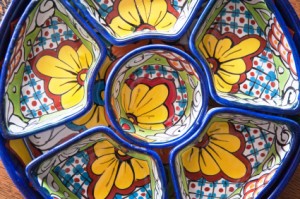

Glazed china, mostly made prior to 1970 or newly imported, is a big source of lead in diets. The glazing that’s applied to the dinnerware is the real culprit. Glazing creates a glossy finish that can be colored, clear or white. China, stoneware, ceramics and terra cotta can all contain lead, especially if the pieces are old or if they’re imported from countries that have few, if any, standards about lead content.
Watch out for highly decorated, handcrafted, dinnerware, or that which has raised, hand-painted areas, because the decorative paint probably contains lead. If the colors are bright and vibrant, chances are the paint is lead based. Also avoid any ceramics that have been chipped, even if it is the finest china.
What about your dishes? Are your favorites, the cups and plates you use every day, a potential lead hazard for you and your children? And what can you do about it if they are? The following will hopefully answer questions you may have about the safety of your china. While the government fact sheet has been removed from the site, here is a good overview. Another source of information is Center for Environmental Health.
You also want to check your wine and liquor decanters as many are made of lead crystal. Given families often keep liquors in these lead crystal decanters for years, the alcohol can become very toxic.
By Annie B. Bond, best-selling and award-winning author of five green living books, thousands of blogs, and all the tips in the Greenify Everything app. Called “The Godmother of Green” by Martha Stewart Sirius Radio.




[…] is the most toxic item on your dinner table? This one invaluable tip will help you keep your family […]
I love the cool colors that were used! The combination is really lovely for the eyes.
Comments are closed.